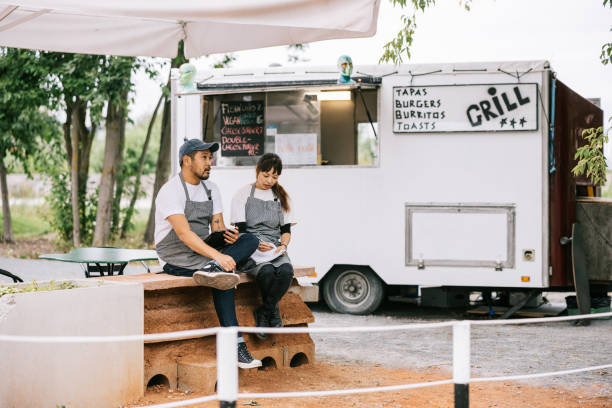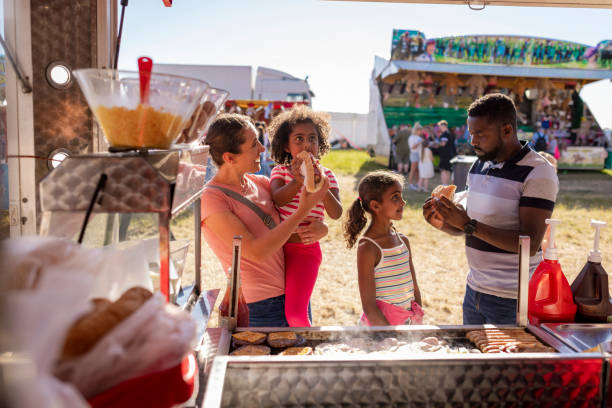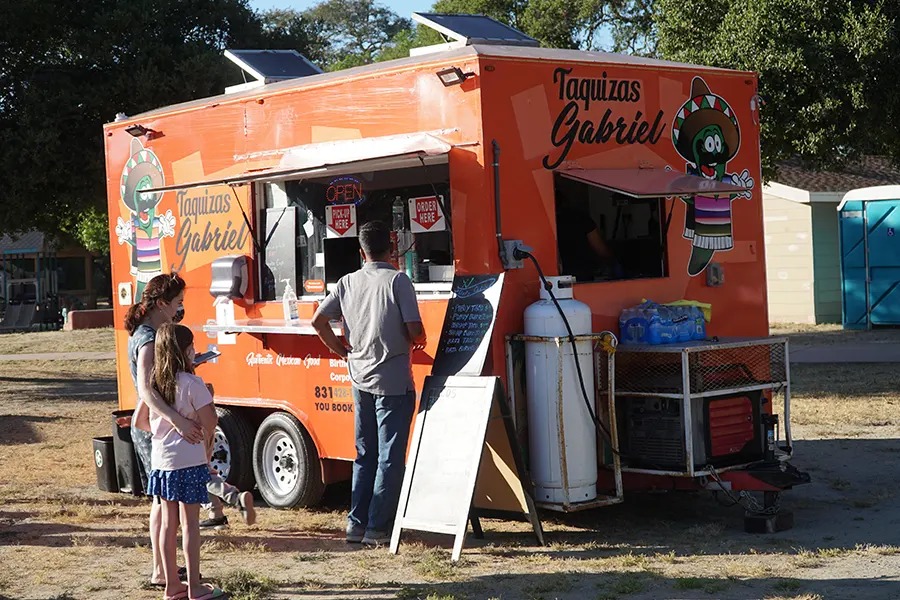Food trailers have become a popular entry point for entrepreneurs looking to break into the food industry. Their low startup costs, mobility, and flexibility make them an attractive alternative to traditional brick-and-mortar restaurants.
But are they truly profitable? And is a food trailer a good investment? Dans cet article, we’ll explore these questions and provide insights into how to make money with a food trailer.
Cost to Start a Food Trailer

Before diving into profits, it’s essential to understand the costs involved in starting a food trailer business. While they are generally more affordable than opening a traditional restaurant, there are still significant upfront and ongoing expenses, which is one of the reasons to start a food trailer business.
1. Getting a Trailer
The food trailer itself is the centerpiece of your business. Prices for a basic used trailer start around $15,000, while custom-built, fully equipped trailers can cost upwards of $100,000. What you need to look for focus on the size, features, and condition of the trailer. If you’re aiming for a specialized “food for profit trailer” with top-tier capabilities, expect to invest more upfront.
2. Getting Equipment
Outfitting your trailer with the necessary equipment is another key expense. This includes cooking appliances, unités de réfrigération, et des solutions de stockage. Depending on your selling items, you may need specialty equipment like pizza ovens or deep fryers. En moyenne, you’ll spend $10,000–$50,000 on equipment.
3. Permitting and Licensing
Every city has regulations for food businesses, and food trailers are no exception. Common costs include health permits, food handling certifications, and parking permits. These fees vary but typically range from $1,000 à $5,000 initially, with annual renewal fees thereafter.
Average Food Trailer Costs (Monthly)
Operating a food trailer comes with ongoing expenses. Some of the major ones include:
- Ingredients: Quality ingredients can account for 20–35% of your revenue.
- Fuel and Maintenance: Your trailer needs to be mobile and reliable, so budgeting for fuel and regular servicing is crucial.
- Labor: Even if you’re running a small operation, you may need extra hands during busy times.
- Assurance: Coverage for your trailer and liability can cost $100–$300 per month.
- Miscellaneous Expenses: Marketing, parking fees, and utilities should also be factored in.
In total, most food trailer operators spend $5,000–$8,000 per month on these recurring costs.
Food Trailer Profit Margin

Profit margins in the food trailer business can be surprisingly high. En moyenne, food trailers have a net profit margin of 6–9%, compared to the 3–5% seen in traditional restaurants. This is largely due to lower overhead costs, as food trailers eliminate expenses like rent and extensive staff payrolls.
Cependant, the profit you make depends on your sales volume and pricing strategy. Popular food trailers in busy areas can generate $20,000–$50,000 in monthly revenue. That said, achieving and maintaining such numbers requires strategic planning and excellent customer service.
Breaking Even for a Food Trailer
Donc, how long does it take to recover your initial investment? The answer depends on several factors, including startup costs and monthly expenses. Assuming you spend $50,000 to start your business and generate $15,000 in monthly revenue with a 7% profit margin, you could break even in about six months to a year. Of course, this timeline can vary based on your location, menu, and marketing efforts.
Pros & Cons of the Food Trailer Model

Before investing in a food trailer, it’s important to weigh the benefits and drawbacks.
Pros of the Food Trailer Model
Flexibility
One of the biggest advantages of a food trailer is its mobility. You can move to high-traffic areas, attend events, or park in neighborhoods with little competition. This flexibility allows you to adapt to changing customer demands and maximize revenue.
Forced Minimalism
A food trailer forces you to work with a limited menu and space. While this might sound restrictive, it can actually streamline operations and reduce waste. A focused menu ensures consistency and helps build a strong brand identity.
Scalability
Food trailers offer an excellent platform for scaling up. Once you establish a successful model, you can expand by adding more trailers or even transitioning to a brick-and-mortar restaurant.
Cons of the Food Trailer Model
Startup Costs
While cheaper than opening a restaurant, starting a food trailer still requires a significant upfront investment. Between purchasing a trailer, équipement, and obtaining permits, the costs can add up quickly.
Vehicle Reliability Concerns
Your food trailer is both your business and your mode of transportation. Mechanical issues can disrupt your operations and lead to unexpected expenses.
You Have to Seek Out Customers
Unlike a traditional restaurant where customers come to you, food trailers require you to actively seek out opportunities. This could mean driving to different locations, promoting your schedule, or competing for spots at popular events.
Food Trailers as a Branding Tool

Beyond just selling food, a food trailer can serve as a powerful branding tool. For startups and brand owners, a food trailer is a unique way to increase visibility and engage directly with customers. Imagine hosting a branded food trailer at a community event or corporate function—it’s an excellent way to build goodwill and leave a lasting impression.
Many successful entrepreneurs have used food trailers as a launchpad for their brands. By combining great food with a strong visual identity, you can create a memorable experience that keeps customers coming back.
Conclusion
Donc, is a food trailer a good investment? For the right entrepreneur, the answer is a resounding yes. Food trailers offer a unique blend of flexibility, scalability, and profitability. While startup costs and operational challenges exist, they are manageable with careful planning.
If you’re wondering how to make money with a food trailer, the key lies in understanding your market, controlling costs, and delivering an exceptional customer experience. With the right approach, your food trailer can become a thriving business and perhaps even the first step toward a larger food empire.
Set Your Food Trailer up for Success With Seeker Trailers
At Seeker Trailers, we craft premium-quality food trailers and offer expert guidance to help you thrive in this competitive industry. Our mentorship ensures you have the tools and knowledge to what you need to do à démarrer une entreprise de remorques alimentaires. Reach out today to learn how we can support your journey toward profitability!
FAQ
Une remorque alimentaire est-elle un bon investissement?
Oui, food trailers are a great investment for entrepreneurs looking to enter the food service industry with lower startup costs and greater flexibility. They offer the opportunity to adapt quickly to market trends, test new ideas, and grow your business without the high overhead associated with brick-and-mortar restaurants.
How much does it cost to start a food trailer?
Starting a food trailer typically costs between $50,000 et $100,000. This includes purchasing the trailer, equipping it with kitchen appliances, and obtaining the necessary permits and licenses. Additional costs like branding and initial inventory may vary depending on your business goals.
How do food trailers make money?
Food trailers generate revenue by selling food and beverages directly to customers. They can also earn income through catering private events, collaborating with businesses, or participating in festivals and community gatherings. To maximize profits, operators must carefully manage costs and maintain a strong presence in high-traffic areas.
What is the profit margin for a food trailer?
The average profit margin for a food trailer ranges from 6% à 9%. This margin is higher than that of many traditional restaurants due to lower operating expenses. To increase profitability, operators should focus on efficient operations, quality food, and strategic pricing.
How long does it take to break even with a food trailer?
Most food trailers break even within six months to a year, depending on factors like startup costs, monthly expenses, and sales volume. Operators in high-demand locations with effective marketing strategies can recover their investment more quickly.
What are the challenges of running a food trailer?
Operating a food trailer comes with challenges such as managing mechanical reliability, navigating regulatory requirements, and consistently attracting customers. Weather conditions and competition can also impact business, requiring adaptability and proactive planning.














